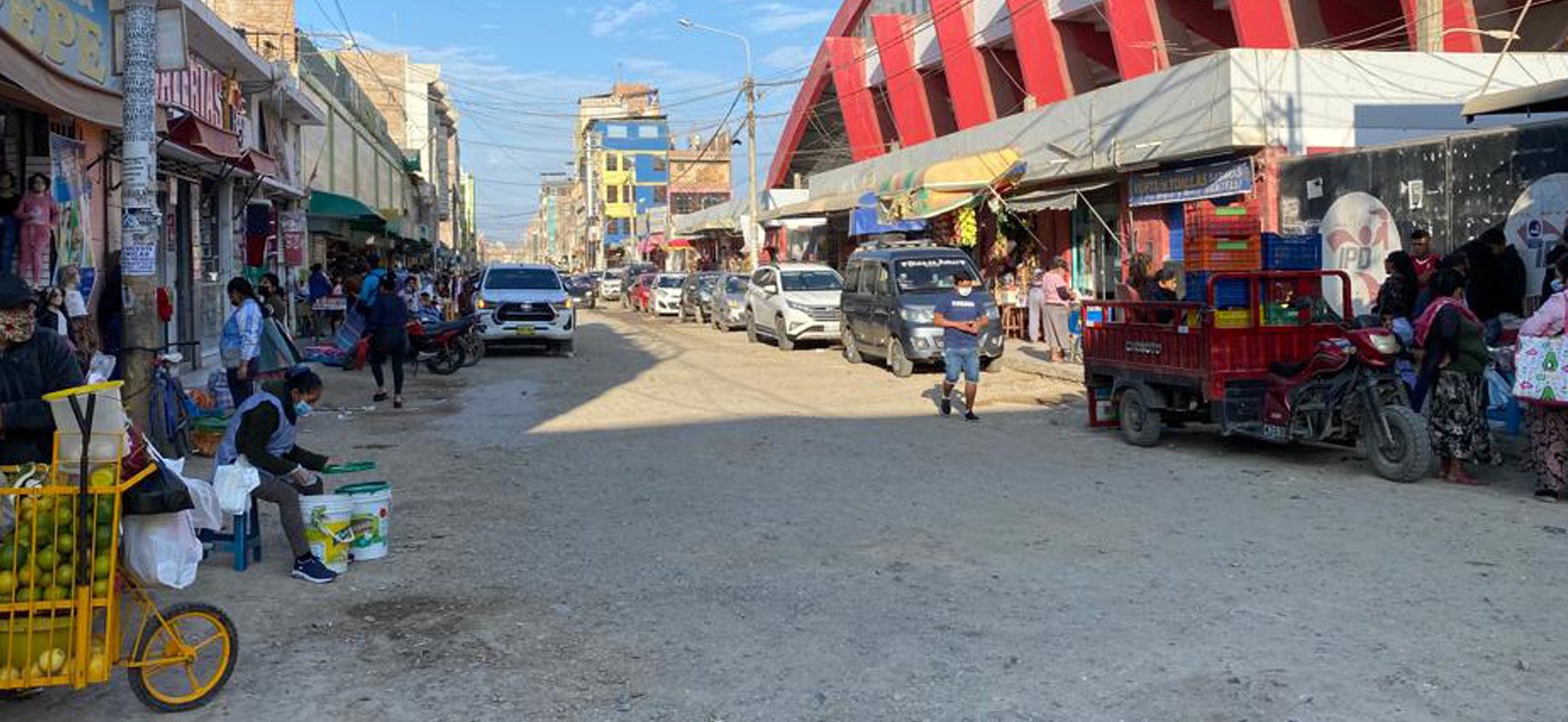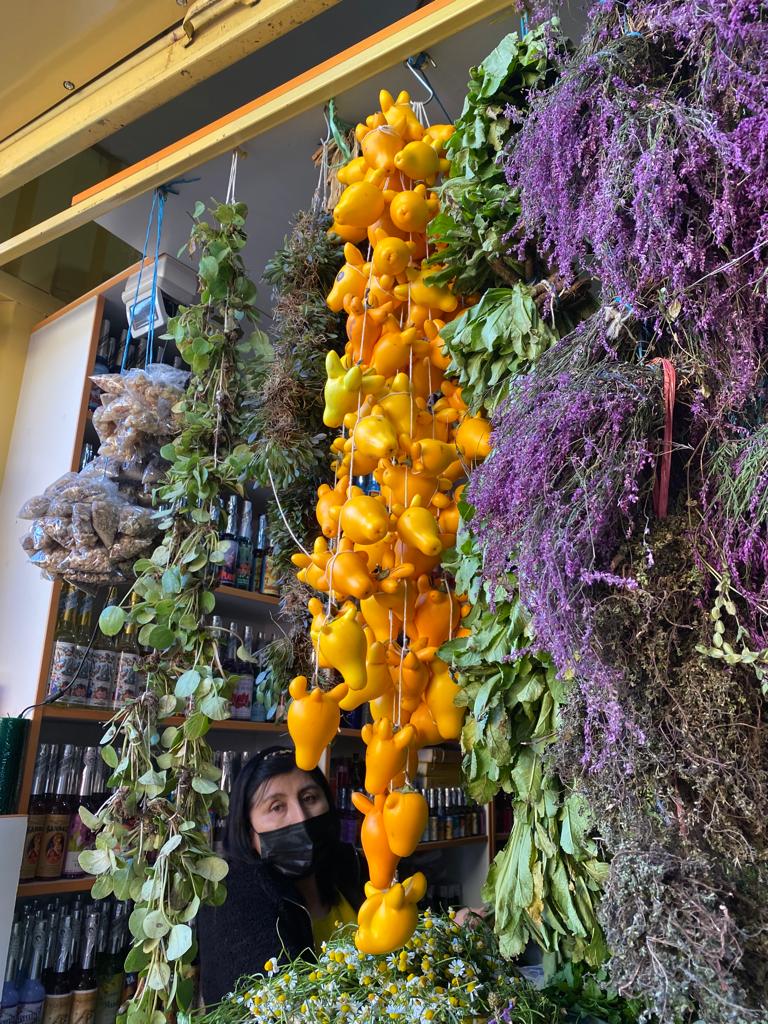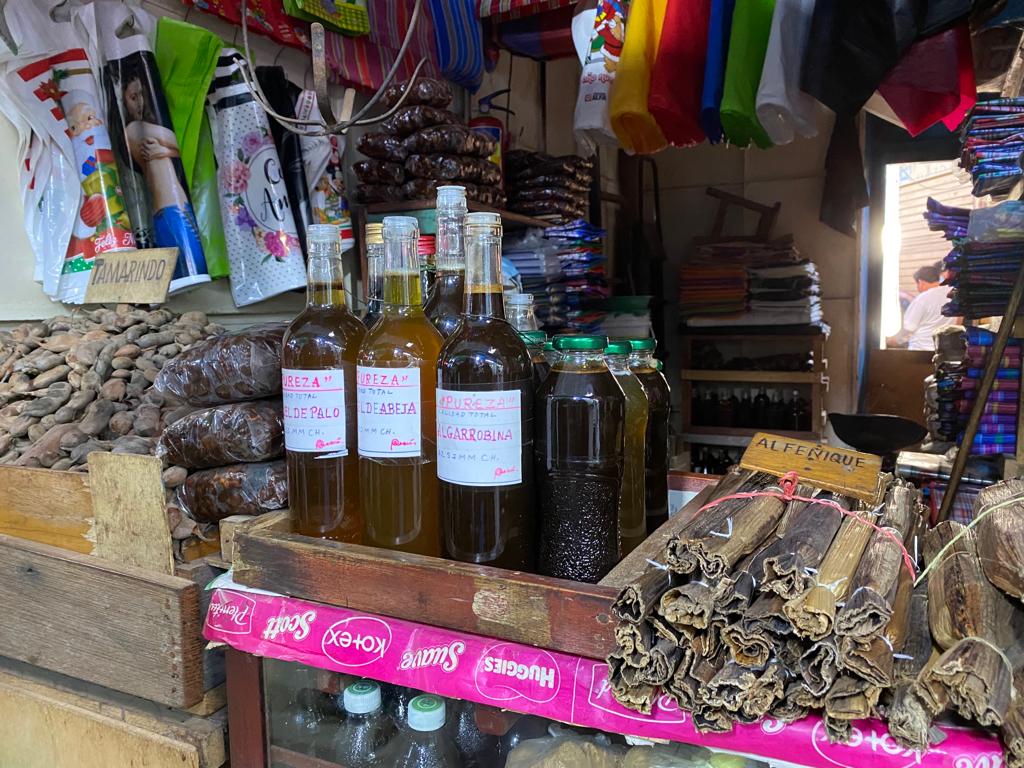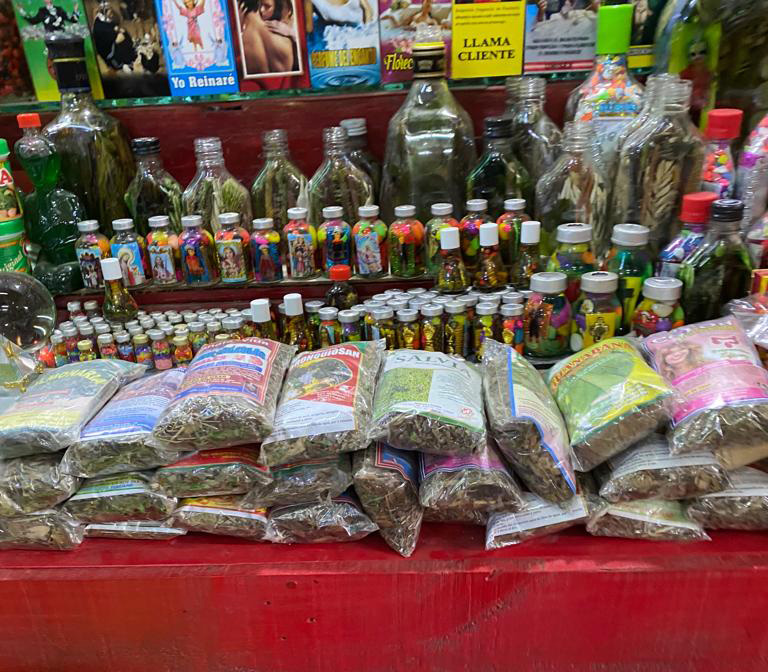The Witches’ Market of Criminal City

Chiclayo sits 800 kilometres along Peru’s coastal highway north of Lima, the capital city. Like most South American towns, the city surrounds a tree-lined central square with a catholic cathedral at one end. But these cheerful administrative centres of a bygone colonial era do not share the same quaint charm in Northern Peru as they do in other areas of the continent. An arid desert wasteland along the coast replaced the lush forested hills of the cordilleras of Colombia and Ecuador, and the pulsating Latin rhythms of cumbia and reggaeton were supplanted by the jarring, high-pitched, wailing of indigenous folk prayers. Small towns along the beaches were deserted and the cities and towns were crowded with traffic. Drivers had little patience always scrambling to be the first through the roundabouts honking and waving from the driver’s side windows as they passed. Thick clouds hung low and humid but it never rained. Hot soot rose from the asphalt as tuk-tuks, with little regard for sensible traffic laws, and the ruddy faces of beggars in torn clothes clogged the intersections.
This is more how I imagined India, not South America, Jenia remarked. This city is like total depression.
Peruvian towns are crowded and disorderly. The roads are dusty from abandoned, half-built, constructions and exhaust from too many jostling trucks, cars and motorbikes. Instead of being greeted with broad smiles and curiosity, locals merely tolerated our presence. Garbage litters the highways and people seem to take little pride in their surroundings. There were no longer any signs of trendy health food shops and craft markets. Casinos and clear signs of prostitution took their place and there was a palpable apathy borne out of a collective despair – the modern symbol of broken windows theory.
Walk confidently, but respectfully, as a visitor. “I am what people are afraid of,” is what I have often said when asked about safety in foreign countries. “If you want trouble, you can find it. If you want to live in peace, you will”. Confidence can protect you, but if it rises to the point of arrogance, neglecting fundamental precautions can put you at risk.
 Witches’ markets can be found throughout Peru and Bolivia. At their root, they are no different from any city’s old central market with produce brought in from the surrounding regions as well as local crafts and supplies. Traditionally, these markets were operated by native shamans who served their communities which is how they earned their name. Among the variety of goods traded at these markets include local herbs, potions, plant medicines and other peculiar remedies either designed to heal the body or ward off evil spirits such as dried llama fetuses to be buried under homes as offerings to indigenous deities.
Witches’ markets can be found throughout Peru and Bolivia. At their root, they are no different from any city’s old central market with produce brought in from the surrounding regions as well as local crafts and supplies. Traditionally, these markets were operated by native shamans who served their communities which is how they earned their name. Among the variety of goods traded at these markets include local herbs, potions, plant medicines and other peculiar remedies either designed to heal the body or ward off evil spirits such as dried llama fetuses to be buried under homes as offerings to indigenous deities.
Peru is a country of extremes. Not only is it home to some of South America’s most dramatic landscapes and mind-blowing tourist attractions, it is also home to cities, towns, and neighbourhoods that no one has any business visiting. Travelling through this region, with so little to draw interest, it is the witches’ markets that operate as central loci around which to explore. We had already had wonderful culinary experiences in Colombia and Ecuador at municipal markets. They were gateways to sampling the local delicacies and the witches’ market offered the opportunity to now test out Peruvian cuisine.
Exploring the witches’ market is an interminable quest for space to plant one’s next step. We slalomed through the crowded alleyways of the market bumping shoulders with everyone who passed. Our white faces and laundered clothes stood out and shopkeepers at every stall pressed for our attention. We sat ourselves down on plastic chairs in front of a small booth that offered prepared food. There was scarcely a moment’s peace to even take a mouthful as every passerby prodded us for charity. The unrelenting chaos of our environment was enough for Jenia to lose her appetite. My realizing that my mobile phone was now gone was enough for me to lose mine.
Soon after we had sat down, one of those brief encounters with panhandlers, an older woman and a young child, felt a little too invasive and was likely nothing more than a ruse to draw my attention away from what was really going on. A feeling of panic knotted up my stomach. Scattered like the refuse on the witches’ market’s floor, my thoughts needed collecting. First, I made peace with the fact that I would likely never see my phone again. I was more upset about the lost photos and contact information collected over the last 4 years. Although the phone contained passwords and a whole host of sensitive information, it dawned on me that any thief would have no interest in them. What would a common thief want or know about what was actually on the phone and its depth of possibilities for future theft? The phone itself was not the prey – I was. Whoever stole my phone would have been relying on the fact that what was on the phone was dear to me. And if we could build a bridge connecting me to the thief then I might be able to get my phone back. There was no shortage of desperate souls in the market and I figured that the criminals were already acquainted with one another.
 I offered my plate to an emaciated kid in his teens begging for change. I asked him if he knew the thieves that worked in the market and he said that he did. The boy mindlessly stuffed my plate of rice and chicken between his dry, chapped, lips and half of it dropped to the floor. I offered him a reward if he could barter with whoever stole my phone and bring it back to me. He was adamant about only doing the job if he got the money upfront but I was never going to offer that level of trust to the untrustworthy. Jenia and I were already the dish of the day and our conundrum became a small spectacle in this dark corner of the market. The restaurateurs were sympathetic and urged me not to trust the boy suggesting that I check in with the commissariat. A kind woman led us by the hand across the market to the office outfitted with security cameras and patrolled by a single uniformed man. The woman explained to him what had happened and there was an immediate consensus that the theft occurred in an area of the market hidden away from security cameras. Jenia had often spoken to me about how where she came from the police and the criminals often live symbiotically. We sensed that if we made a scene and demanded justice that we would never see the phone again. Though no one could be trusted, we felt that, if we played the situation in just the right way, there was a reasonable assumption that my phone could be retrieved.
I offered my plate to an emaciated kid in his teens begging for change. I asked him if he knew the thieves that worked in the market and he said that he did. The boy mindlessly stuffed my plate of rice and chicken between his dry, chapped, lips and half of it dropped to the floor. I offered him a reward if he could barter with whoever stole my phone and bring it back to me. He was adamant about only doing the job if he got the money upfront but I was never going to offer that level of trust to the untrustworthy. Jenia and I were already the dish of the day and our conundrum became a small spectacle in this dark corner of the market. The restaurateurs were sympathetic and urged me not to trust the boy suggesting that I check in with the commissariat. A kind woman led us by the hand across the market to the office outfitted with security cameras and patrolled by a single uniformed man. The woman explained to him what had happened and there was an immediate consensus that the theft occurred in an area of the market hidden away from security cameras. Jenia had often spoken to me about how where she came from the police and the criminals often live symbiotically. We sensed that if we made a scene and demanded justice that we would never see the phone again. Though no one could be trusted, we felt that, if we played the situation in just the right way, there was a reasonable assumption that my phone could be retrieved.
My Spanish always improves when disaster strikes. Having made peace with the likelihood that my device was lost and this now presented an opportunity to purchase a new phone, I explained our situation in a calm and steady voice to the commissariat, a middle-aged man named Umberto. I explained that, if my phone could be returned, I would be happy to pay the thieves for their work and that I did not want any kind of trouble. All that I wanted was the device, the data that was on it, and to be left in peace. For this, I was willing to pay. Umberto understood my frustration and my position and said that he knew a man who handles these kinds of situations and if there was someone who could find my phone, that it would be him. Umberto made a brief phone call and told us that we would need to wait for about an hour.
During our wait for Umberto’s mystery man, Jenia put me through the various steps of how to keep one’s possessions from the nimble fingers of thieves and hustlers. She showed me the strap that she used to chain her own phone to her person and suggested that I have one of my own. We disagreed about what sort of person walks the streets of most cities. She seemed to believe that a common criminal was exactly that: common. I continued to maintain that violent robberies and petty pickpocketing were exceedingly rare.
If someone wanted to, they could take whatever and you would not even know, she said scolding me with a raised finger.
 I blamed myself, not the thief. I had let down my guard in such a place where my awareness should have been better attuned to my surroundings. I was the mark and I hated myself for having been taken advantage of. Jenia suggested buying a fanny pack in which to carry my passport and my wallet. Until then I had been entertaining the notion of taking greater precautions with my valuables but to that suggestion, I simply giggled with derision. Thievery is just a job like any other job – dishonest as it may be. In a consumption-driven economy, most of what we own we do not need, so what is a modern retailer but an honest thief? Whoever stole my phone was plying their trade to earn their daily bread and they had succeeded. They had done their job well.
I blamed myself, not the thief. I had let down my guard in such a place where my awareness should have been better attuned to my surroundings. I was the mark and I hated myself for having been taken advantage of. Jenia suggested buying a fanny pack in which to carry my passport and my wallet. Until then I had been entertaining the notion of taking greater precautions with my valuables but to that suggestion, I simply giggled with derision. Thievery is just a job like any other job – dishonest as it may be. In a consumption-driven economy, most of what we own we do not need, so what is a modern retailer but an honest thief? Whoever stole my phone was plying their trade to earn their daily bread and they had succeeded. They had done their job well.
After being left to stew in my feelings of frustration and inadequacy, Umberto’s mystery man finally arrived. Robert was a short middle-aged man with broad rosy cheeks that pushed his eyes into a squint. He was wearing slacks and a dress shirt as if he had just come from a casual business lunch. Short of breath and wiping sweat from his brow with an embroidered hanky, he greeted Umberto and the two of them smiled through a short exchange of pleasantries before we were introduced.
Where are you from? Robert asked.
Canada, I said. My girlfriend is from Russia.
Oh, how nice! he replied. I hear that Canada is wonderful. Umberto said that you have lost your phone and that you want it back and that you don’t want any trouble and, if you can have it back, you will just leave. Is that correct? Struggling to understand his version of Spanish, I repeated the sentiment back to him in my own way. How much money are you willing to pay to get your phone back? he asked.
Two hundred soles, I told him.
Okay, wait here and I will see what I can do.
Robert left the office. Jenia and I barely had time to put a sentence together or think about how the rest of this story might play out when Robert, still short of breath and wiping sweat from his brow, returned to the office and placed my phone and my SIM cards on Umberto’s desk. Jenia and I looked at each other with suspicion. Robert could not have been gone from the office for more than 30 seconds.
I placed the 200 soles on the desk and took my phone. I offered Umberto and Robert some money for their trouble which they vehemently declined.
I smiled at the two men and said: Today I paid 200 soles for a very important education. Where I come from that’s pretty cheap.
My little joke broke the tension as we left the commissariat’s office, found the nearest exit of the witches’ market and headed back out onto Chiclayo’s dusty, garbage-strewn, streets.
I inserted the SIM cards back into the phone and turned the power on only to discover that the thief had performed a factory reset and that all of my data, aside from the operating system, was lost. It would have been easy to do, and no less than I deserved in this situation since I never used a password to open my phone. When I told her, Jenia looked at me incredulously. I reiterated that no one in their right mind would want anything that had been on the phone and that was never the point of why it was stolen. It was stolen because it contained things that I, and no one else, wanted. After four years and countless drops, parts of the screen were shattered and, as a device, the phone was becoming obsolete and limited in its resale value. This was my miscalculation. In an age where everyone has their own cell phone for their photos and contact information, I had become ignorant about the fact that there were still folks out there who would prey on the value that these devices held in the hearts of their owners. Without the data, I had paid 200 soles for the education and did not need to buy a brand-new phone.
As we had done in the commissariat’s office, we repeated the reforms I would undertake and the various precautions I would institute to ensure that this never happened again. On the walk back to our hotel, we stopped at various cell phone repair shops to ask if my photos and contact information were retrievable somewhere in the device’s encrypted circuitry. All of the shops we visited bragged that they could do the job, but no one was successful. Jenia maintained that the right technician would be able to restore this information and she persisted that, now that we actually had the phone back in our possession, we should not give up our search.
It had been a frustrating day and meandering through the streets of this dusty grey town did nothing to assuage the day’s disappointments. More hurt than anything was my own pride. I felt like a chump. Most days, I thought of myself as the sophisticated world traveller, someone who had been everywhere and seen it all. But now I was nothing but an easy mark. A pigeon.
Jenia pointed to another cell phone repair shop and suggested we ask, yet again, about restoring the data. I looked around and saw the grey faces of the locals of this disgusting town and my anger washed away with a wave of pity. For us, Chiclayo was a fueling station. It was an unthought-of spot on a map. Its disordered streets and sewer-swelling rivers of shit tomorrow would be nothing but a memory. For its half-million residents, including our thief, this was home. I could not imagine that any of them would ever be as fortunate as Jenia to be on such an adventure. In fact, many of those faces passing us in the street would probably never leave.
No, I stated firmly. That’s enough.
What do you mean? Jenia asked.
No more trying to get the data back. No straps. No fanny packs. No passwords on phones.
Jenia looked at me like I had lost my mind.
My phone got stolen. I’ve lost my photos and my contacts and that sucks. But if I let it change me, then the thief wins.
We have each other, Jenia pointed out. We are safe.
Exactly.
Okay, so what’s the plan? she asked.
Revenge, I said.
Revenge?
Here’s what we are going to do. We’re going to go to the Metro supermercado at the other end of town and treat ourselves to beer and whatever we want to eat for supper. Then we’re going to go back to the hotel and use that silly hot tub that we have. We’ll get a little tipsy, lie back in bed, watch a movie, and do nothing for the rest of the day. Then tomorrow we’ll get into the car and drive away from this place and never return.
I like this plan.
We shut ourselves into our room, closed the curtains, and drew a hot bath. Jenia poured the entire contents of our complementary shampoo bottles into the water. When the bath was full, we turned on the massaging jets causing massive clouds of soap bubbles to rise up to the ceiling. Our tiny bathroom became a wall-to-wall foam party for two as we giggled the rest of the day away.
The discussion of security was never too far from our minds. How Jenia and I each felt about where to go from where we were had a lot to do with where we had already been. Growing up in Russia soon after the fall of the USSR, Jenia remembered a time when it was unsafe to go outside. She called it “the deficit time”. Her country was safe but those memories lingered. Growing up in Canada, I was sheltered from most of the evil in the world. Canada can often seem like a boring place where nothing much really ever happens. Revolutions and armed conflicts are someone else’s problem. Political strife and turmoil, anything that makes the international news, is something that happens over there. But it is the 24-hour news cycle that makes the catastrophes of the world seem to overlap with one another. The result is a sense that danger lurks just outside your door. One crackpot makes headlines and we believe that what can happen there can happen anywhere and, if it can happen anywhere, then it can happen to me. The truth is the world is never as dangerous as we think it is. No one is waiting in a dark alley to accost you. The truth is you are not very important and there is a good chance no one even knows that you are there. Criminals are opportunistic, not stupid, and they are rare. Most people just want to be loved and we all derive more joy from helping others than taking advantage of them.
As we sipped our drinks and snacked on olives, chocolate, and fresh fruits, I felt sure that one day I would let my guard down again and have something of value stolen. Thieves exist. It is a fact I have come to accept but it is not how I want to see or shape the world. Until that day comes, I will try to have a mind on my surroundings knowing that it is my attention and my awareness of the present moment that not only helps to see wonder and beauty in the world but is also my strongest defence against those that might prey on my carelessness. To every thief that might seek to take advantage of my naivete, know this: You are participating in an endeavour you have no chance of winning. You can steal my phone and you can take my money, but you will never rob me of my joy.
